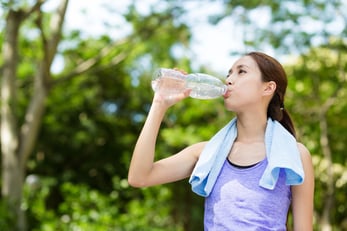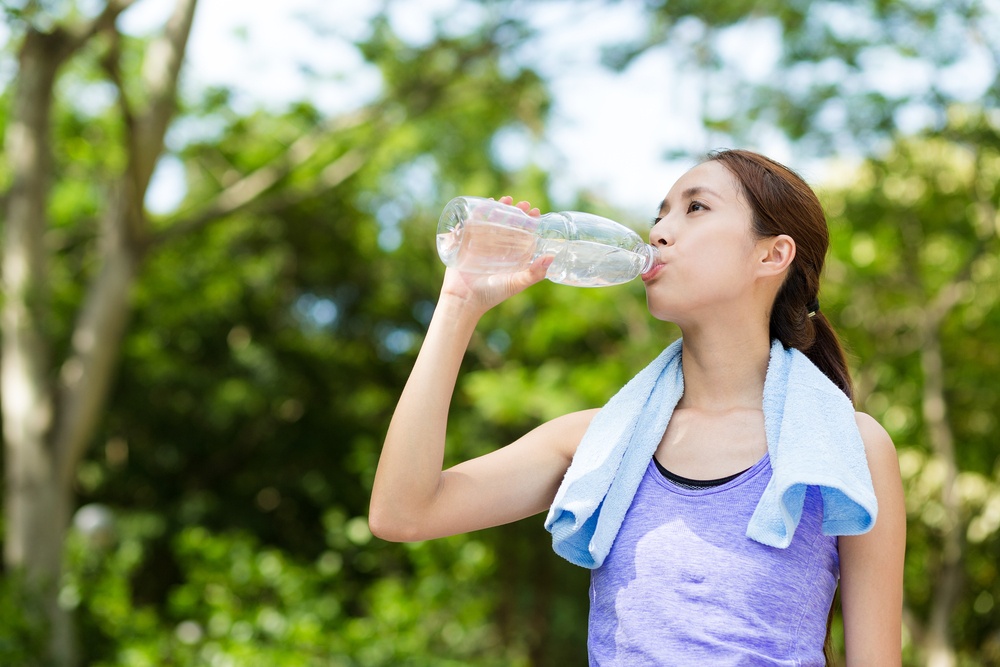Determining your sweat rate will help you to figure out what your hydration needs are after exercising.
These guidelines are the basic rules of thumb, but it’s important to remember that everyone’s fluid needs vary as some people sweat more than others.
 To determine how much liquid to take in during an intense workout session, you need to know your sweat rate, which can vary as much as one to four quarts per hour. Weigh yourself nude before a timed training run, ride or session and then again after the session. One pound of weight loss equals one pint of water loss. Calculate your sweat rate and use this to determine your fluid needs during your activity. For example, if you lose two pounds during an hour run, that’s two pints or 32 ounces 16 oz/pound. You don’t want to gulp down all the fluids at one time because your stomach cannot absorb it all at once.
To determine how much liquid to take in during an intense workout session, you need to know your sweat rate, which can vary as much as one to four quarts per hour. Weigh yourself nude before a timed training run, ride or session and then again after the session. One pound of weight loss equals one pint of water loss. Calculate your sweat rate and use this to determine your fluid needs during your activity. For example, if you lose two pounds during an hour run, that’s two pints or 32 ounces 16 oz/pound. You don’t want to gulp down all the fluids at one time because your stomach cannot absorb it all at once.
Therefore, you should spread out the amount of fluids you intake during each session. You need eight ounces of water or electrolyte beverage every 15 minutes.
If your urine is dark yellow after a heavy workout (or anytime, really) this is a sign you need to re-hydrate. Urine should normally be a light lemonade color. Early signs of dehydration include increased thirst, headache, nausea, dry mouth, reduced urine output, dark yellow urine, and decreased performance.
Moderate signs of dehydration include extreme thirst, dry appearance inside the mouth, decreased urination, decreased performance, sweating output will be noticeable different than usual and light headedness, Higher heart rate and blood pressure while exercising and while at rest.
Serious dehydration can lead to cramps, chills, disorientation, higher heart rate and blood pressure both during exercising and resting, and fainting etc. Less water makes the blood sticky and harder for the heart to move the blood around the body.
Myth: You should obey your thirst and drink when you mouth is dry and when you feel the need to drink.
Truth: If you wait until your mouth is dry it is too late. You are already in moderate dehydration state and you will need to hydrate immediately.
Try to drink water throughout the day and before you workout. If your workout is longer than 30 minutes you need to be drinking water throughout the workout. During longer workouts (60 to 90 minutes) may require some water or electrolytes depending on your workout and your overall training schedule.
Why should you begin to drink six to ten glasses of water each day?
Proper water consumption provides the foundation for a healthy lifestyle and helps to improve many body actions such as;
- Regulating body temperature
- Lubrication of joints
- Nutrient transportation
- Removal of various waste materials from the body
- Ensures proper digestion
- Maintain healthy skin and tone.
- Maintaining healthy cardio function
- Reduces water retention (water hording)
- Clear thinking
Consuming water does not include drinking pop, juice, tea, coffee, and diet pop. To bring some flavor to your water, you can add some lemon/lime or other fruit and herbs in it.
Hydration can also come from watery fruits, vegetables, and herbal un-caffeinated teas. Caffeinated beverages are dehydrating and increase your need for water. Generally you need one to two cups more water for every cup of caffeinated beverage you consume.
Most people don’t know what it is like to be truly hydrated. If you have any symptoms that may relate to the above, my challenge to you is to make an effort to take in enough water every day for two to six weeks.
Write down your symptoms before you begin and at the end of your chosen time frame. Compare how you feel before and after the challenge. This should motivate you to continue consuming more water in your daily life.
Can you over hydrate?
Absolutely, physiotherapists look for symptoms such as confusion, dizzy, light-headedness, and fainting at the end of long events like a marathon’s and/or triathlons. Drinking too much water can dilute our body’s electrolyte balance. This is caused when sodium levels drop below 135 μmol/L. For example, when athletes consume large amounts of fluid during their training, or trying to break a record. Water intoxication can be prevented if a person's intake of water does not grossly exceed their losses. Healthy kidneys are able to excrete approximately 800 millilitres to one litre of fluid water (0.84 - 1.04 quarts) per hour. However, stress from prolonged physical exertion and illness can reduce this amount.
What about Sports drinks?
Electrolytes and carbohydrates help athletes to refuel and rehydrate their body. This is what makes sports drinks so popular with athletes. Electrolytes help balance the body's fluid balance, while the carbs provide energy and help with absorption. Sports drinks claim their product hydrates better than water because of these additional ingredients.
This may be ok if you are an athlete who plays and practices more than five times each week for 90+ minutes. But, this is not a solution for those who are exercising at a lower intensity or young children. These products contain too much sugar, sodium and food dyes that are made from petroleum products. These ingredients are not good for our blood sugar, cardiac health, dental hygiene, and waistline.
For a healthier choice, if you need to give yourself an electrolyte/hydration boost, try drinking some coconut water instead.




